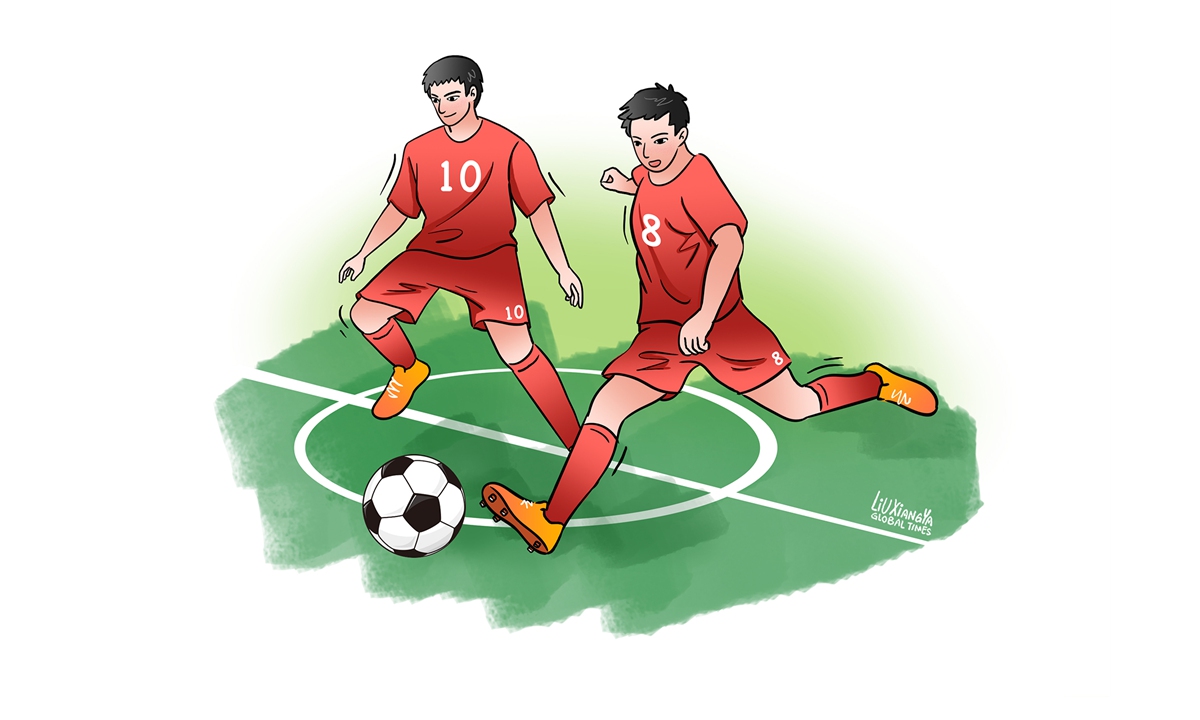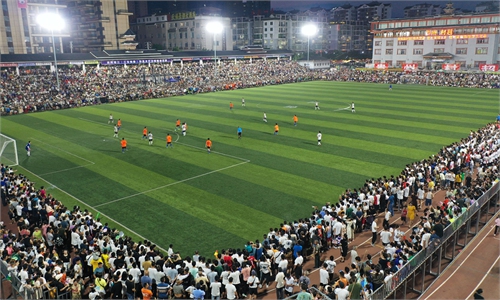ARTS / CULTURE & LEISURE
Challenges, opportunities during China’s Asian Games soccer campaign
China’s soccer faces dares, chances during Asian Games

Illustration: Liu Xiangya/Global Times
Chinese soccer fans, who have recently witnessed lackluster performances of the national teams, including the men's under-23 team's challenging qualification process for the Asian Cup and the national senior team's struggles in friendly matches, are hoping that the Asian Games teams can bring them some joy through an outstanding performance.
Thankfully, the men's national under-24 soccer team started their Asian Games campaign on Tuesday with a 5-1 over India at the Huanglong Stadium in Hangzhou, East China's Zhejiang Province. Their subsequent group stage matches will be against Myanmar on Thursday and Bangladesh on Sunday.
The men's competition now features 22 teams divided into six groups after Afghanistan and Syria withdrew from the tournament, with two groups having only three teams. The top two teams from each group and the four best third-placed teams will advance to the round of 16, making China's path to the knockout stage relatively smooth.
The postponement of the Hangzhou Asian Games from 2022 to 2023 has led several Asian soccer associations to dissolve their under-23 teams, the eligible age group for the Asian Games after the conclusion of the Under-23 Asian Cup in June 2022. Instead, they are focusing on the upcoming 2024 Paris Olympic Games soccer qualification and the U23 Asian Cup in 2024. This means that most teams will participate with U22 squads born in 2001, and some may even send U20 national youth teams to the Asian Games.
Considering the age structure of participating players, this works in favor of China's men's national soccer team. Particularly, the key players in the China team, for example Zhu Chenjie and Dai Weijun, have significant experience in the top-tier Chinese Super League and had been summoned to represent the national senior team at the previous World Cup Asian qualifiers.
China's head coach Dejan Djurdjevic said the team has been preparing for the Asian Games for over six months and he is working hard to ensure that all 22 players have good chemistry to face the upcoming matches. Notably, there are two ethnic minority athletes included in China's squad, Yeljan Shinar and Ablahan Haliq, who have been pinned as the hopes to diversify the team's offensive tactics. However, Djurdjevic hopes of seeing the team play seven matches - indicating the team will step into the final - will not be an easy feat.
Although Asian soccer powerhouses Japan are sending a squad comprised mainly of reserve players from professional clubs, and Australia is not competing - as it is a not a member with the Olympic Council of Asia - the overall competitiveness of Asian soccer remains strong. The biggest challenge on China's path to the final is likely to be South Korea. Having won consecutive gold medals at the 2014 Incheon Asian Games and the 2018 Jakarta Asian Games, the South Korean team is considered one of the favorites to win as they aim to claim a historic hat trick on the Asian Games title.
Boosted by the presence of Paris Saint-Germain midfielder Lee Kang-in and motivated by the exemption clause of military service if they are able to collect a gold medal at the Asian Games, South Korean soccer players' presence at the Asian Games will be strong, and highly likely to be the "roadblock" in the quarterfinals for China's quest to the gold medal. However, in two friendly matches held in June, China's team managed one win and one defeat against the South Koreans. With the support of home fans, China's team has a chance to deliver a result beyond their capabilities.
In another development, China's women's national soccer team arrived in Hangzhou on Tuesday. Head coach Shui Qingxia said that their preparation time for the Asian Games is relatively short since it doesn't coincide with FIFA international match dates, resulting in some overseas-based players not being called up.
China's women's team is placed in the same group as Mongolia and Uzbekistan. On Friday, they will start their Asian Games campaign against Mongolia in their opening group stage match. Securing a spot in the knockout stage should not pose a significant challenge for the "Steel Roses," and their ultimate goal is of course the championship.
However, China's women's team will also face formidable opponents. Japan has sent their second-string team to the Asian Games, with only one player Remina Chiba having participated in the FIFA Women's World Cup. South Korea and Vietnam, both of whom didn't advance beyond the group stage in the Women's World Cup, have aspirations to perform well in the Asian Games. Hence, the path to the pinnacle for China's women's team is likely to be bumpy.
The author is a reporter with the Global Times. life@globaltimes.com.cn

